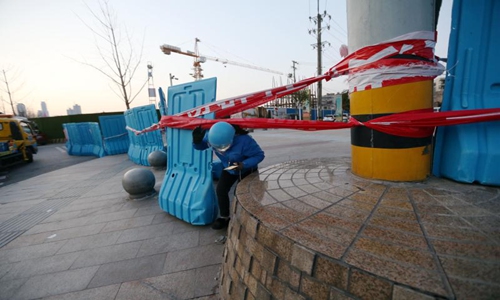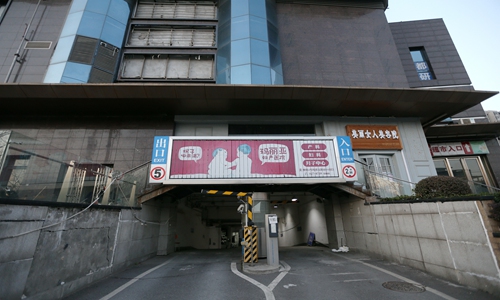HOME >> CHINA,SPECIAL-COVERAGE
Wuhan to finalize task of screening virus patients
By Chen Qingqing Source:Global Times Published: 2020/2/19 22:28:40
Human transmissions continue as deadline to screen cases looms

Photo: authorities in Wuhan, epicenter of the deadly novel coronavirus pneumonia (COVID-19) in Central China's Hubei Province, make a final call to mobilize local residents to take part in prevention and control work. Photo: Cui Meng/GT
It has become the most urgent task for the epicenter of the highly contagious virus that has caused over 70,000 infections nationwide to adopt the strictest measures to contain the virus spread, given the actual numbers of infections remain unknown and mandatory self-quarantine policies are considered less efficient, which had not completely stopped human-to-human transmission. Delayed reaction and slow response at early stage of the outbreak also made the task even more challenging now.
Authorities in Wuhan, epicenter of the deadly novel coronavirus pneumonia (COVID-19) in Central China's Hubei Province, made a final call to mobilize local residents to take part in prevention and control work as the deadline for screening all confirmed and suspected infections loomed on Wednesday, while any local official who fails to finish the task will be held accountable.
Wang Zhonglin, Wuhan's new Party chief, said that all the urban districts should provide accurate data of total infections as of midnight Wednesday. "Without knowledge about how many infected patients there are in the city, we can't win this battle against epidemic," he was quoted as saying in media reports on Tuesday.
The Wuhan epidemic prevention and control center issued a regulation to seal off all residential communities to contain the spread of the virus on Friday as local authorities ramped up efforts to enforce the law, particularly after some local residents appeared to not follow mandatory self-quarantine - going outdoors and even gathering at public places.
When prevention and control work in provinces and municipalities outside Hubei yielded positive results as new infections dropped for 15 consecutive days as of Tuesday, Wuhan was still confronted with a severe situation with slow progress.
The actual number of overall infections in the city where the virus originated in December 2019 remained unknown; the number of reported cases in the city accounting for a large portion of total infections in China. And despite over three weeks of city lockdown, the human-to-human transmission still continued and many patients could still not be treated in time, according to medical experts and observers.
It's time to sound horns for a full-scale mobilization of Wuhan people, which is decisive as it is about the people's war, according to observers and local officials.
Social workers and officials on the community and district level in a city with a population of about 11 million are now facing the most urgent and challenging task within three days: To make sure infected patients are treated in hospitals, suspected patients to finish nucleic acid tests, close contacts to be put in quarantine, and all residential areas to conduct 24-hour seal-off management. All these tasks should be finished by Wednesday, and no delay would be tolerated, Wang told a meeting on Sunday.
Though Wuhan is the epicenter, its policy of 24-hour seal-off management in residential areas came up late, even behind other cities in Hubei that adopted strictest control measures.
Cities like Shiyan launched wartime control measures since February 12, and Xiaogan released the same policy on February 13, restricting in and out in local residential areas.
Xianning even launched seal-off management on February 3, restricting people's access to communities and setting up temperature measurement at the entrance.
To further regulate residents from going out, the local transport authority in Wuhan issued a regulation on Tuesday banning all private cars on the road. Those vehicles designated for use in prevention and control work, public transport, and vehicles to transport necessities and those for emergency purposes are exceptions.
"This is a battle we don't have the route to retreat," Wang said, noting that an effective screening would guarantee the cut-off of the source of the contagion, ensuring that we would win this war. All district officials have to promise that suspected and confirmed patients won't stay at home starting Wednesday. "If they fail to do so, district Party chiefs and directors would be held accountable," he said.
"If local authorities would have taken this action earlier and acted more efficiently, the situation in Wuhan would have been better now," a local resident surnamed Chen told the Global Times on Wednesday. She lives in a residential community near Wuhan's Hongshan Stadium, which started to arrange collective delivery services for daily necessities on Monday.
"Some people had to go out and did not intentionally violate the regulation," she said, noting that in her community, without previous arrangements of such delivery services, residents needed to go to a nearby supermarket.

Photo: authorities in Wuhan, epicenter of the deadly novel coronavirus pneumonia (COVID-19) in Central China's Hubei Province, make a final call to mobilize local residents to take part in prevention and control work. Photo: Cui Meng/GT
Urgent taskLocal authorities in Wuhan and Hubei have been harshly criticized for their delayed response to the outbreak, ineffective emergency and response mechanism in the face of such a major public health crisis, as well as loopholes in local governance that have been weighing on the prevention and control work. Two top local officials - the Party chiefs in Wuhan and Hubei - were recently removed from their positions while efforts have been urged to correct bureaucracy and formality for formality's sake. The epidemic battle in the city remains decisive for the overall prevention and control work in the country.
Some social workers told the Global Times they have been working around the clock in recent days, and officials who fail to fulfill their duties were summoned or removed from their positions.
"We have been facing the shortage of staff for weeks, as we are in charge of not only screening suspected and confirmed cases in the community but also helping residents to purchase daily necessities," a social worker surnamed Wang told the Global Times.
"It has been excessive workload. The situation has become more intense, and our task has become more urgent," she said.
Hubei has 61,682 reported infections as of Wednesday, from which Wuhan reported 44,412 cases. The epicenter also reported 1,660 new infections on Tuesday while other cities in the province all reported new cases below 100.
Although all residential areas have been shut down since Friday, some residents in Wuchang and Hankou districts still showed up outdoors as the Global Times learned. Some even went out without wearing masks.
"Some elderly people, who are usually very stubborn, refused to do what they were told as they don't believe in the scientific way of containing the spread of virus. Some simply don't understand," a source close to the local district government in Wuchang told the Global Times on Tuesday. "It's also difficult to communicate and change their mind-set overnight."
On Wednesday morning, police officers in various districts also joined the prevention and control work by checking out whether people brought their temporary 'pass' with them when they went out, according to local media reports. They also persuaded over 20 residents who intended to go out to stay at home.
A resident in Hongshan district who did not wear a mask was given a five-day detention after he refused to correct his behavior, the reports said.
Zhong Nanshan, China's top epidemiologist and the central government's top medical adviser, told a press conference on Monday that there are two problems that have to be solved: continuing human-to-human transmission in Wuhan and separating coronavirus patients from flu patients. Although the number of confirmed cases continues to drop nationwide, 80 percent are still in Wuhan with a relatively high mortality rate.
"I'm not a social worker but I was informed today that I may join the community work soon," Huang Yan, an employee of a state-owned company who lives in Baibuting community, told the Global Times on Tuesday. "As long as everyone mobilizes, it can be called the people's war."
Posted in: SOCIETY,FOCUS